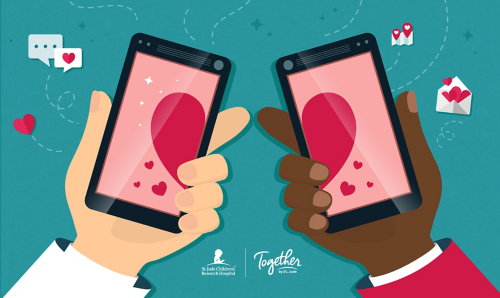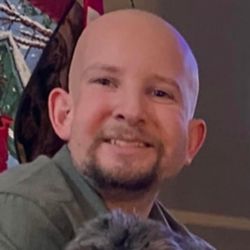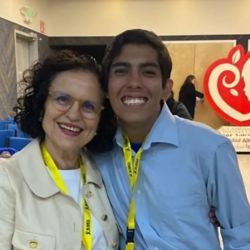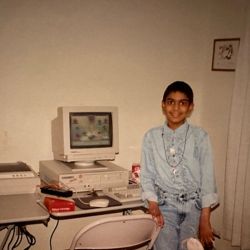A Childhood Cancer Survivor’s Guide to Dating

For young adult survivors of childhood cancer, dating may feel mysterious and messy. But dating is a skill anyone can learn.
Dating is as important for young adult survivors of childhood cancer as it is for their friends who did not have cancer.
But cancer survivors might follow a different timeline.
“Relationships and social connections are central components in our lives. This is especially true in teens and young adults,” says Victoria Willard, PhD.
Willard is a clinical psychologist at St. Jude Children’s Research Hospital. She studies social connections between adolescents and young adults with cancer and their families and peers.
Plenty of childhood cancer survivors make friends easily, date regularly, and have successful sexual relationships, says Lydia Chevalier, PhD, a clinical psychologist in the Sexual Health Program and Perini Family Survivors’ Center at Dana-Farber Cancer Institute.
But if you have some problems in these areas, you are not alone. A survey of 291 adult survivors of childhood cancer found that nearly 1 in 3 reported concerns related to sexual health such as a lack of interest in sex. The study appeared in The Journal of Sexual Medicine.
Dating delays: You are not alone
Chevalier says dating comes up often in her work with young adult cancer survivors. Both men and women struggle with the issue.
“People will admit that they had not dated at all or that it had not gone well, or they did not know how to date, and they had not talked to anyone about it,” she says.
There are many reasons why starting to date may take a little longer than it did for others. These may include:
- Due to treatment, you may have missed the formal and informal education of your friends and peers.
- You may have missed sexual education classes.
- Treatment might have kept you isolated when your friends were talking to each other about flirting, first dates, or the thrills and disappointments of romance.
- After active treatment, you may have been too busy creating a new life to make time for dating.
- You might struggle with poor body image or fear rejection due to scars, body changes, hair loss, or delayed development.
Dating relationships may feel mysterious and messy, but Chevalier says you can break down the process into concrete steps.
“This is something survivors can learn,” she says.
Dating decisions: Plan to share your story
A key step for many survivors is planning when and how to disclose their childhood cancer history. In interviews, adult survivors of childhood cancer told Chevalier that even thinking about having to talk about their cancer history kept them from dating.
“Survivors tell me they feel like cancer changed them in a negative way and that no one is going to want to date them,” she says.
Willard says you should decide what you are comfortable sharing about your cancer history. “There are different versions of your story,” she says. “Not everyone needs to know the nitty-gritty details.”
Chevalier says to keep it simple at first. For example, if your date asks about a scar, say: “I was pretty sick when I was young, but I am fine now.” If the relationship gets more serious, you can bring up your cancer if you want to.
“Think about what’s important to share and what they may not need to know,” she says.
“Dating is something survivors can learn. If they have not dated, this is something they can change if they want to. As with so many things in life, if you break it down into smaller steps you begin to realize change is much easier than you thought.”
Dating: Break down the steps
Chevalier says good cognitive behavioral therapists who treat anxiety should be able to help survivors get started. It all starts with identifying the skills you need and practicing them.
“Hearing that is a huge relief for some survivors,” she says.
For some, the first step may be downloading a dating app, writing a profile, and selecting a photo. Others may choose to go to a meet-up group organized around common interests, such as plants, board games, or sports.
You might start by introducing yourself to 2 people. The next week, you might talk to someone about what you do for a living.
The first step may be different for young adults living at home or who depend on their parents for transportation. Some say independence is a key to dating.
“All this can be big and scary,” Chevalier says. “So, we make a list of different small steps and start with the easiest.”
Dating may also look different for survivors with:
- Mobility issues
- Cognitive effects of treatment
- Other changes related to their disease
- Late effects of treatment
Willard urges survivors to remember that dating has always looked different for different people.
“There are many ways to do this,” she says. For example, if you are a survivor, you do not need to date lots of people. “There is a benefit to finding one person who really gets you.”
Dating reminders for childhood cancer survivors
Ready to date, but not sure how to start? Lydia Chevalier, PhD, of the Perini Family Survivors’ Center at Dana-Farber Cancer Institute has these reminders:
- Dating is awkward: “You are with everyone else on this, especially since the pandemic.”
- Dating is possible at any age: “There are many reasons people have not dated until their late 20s or 30s, so you are not alone. People do not realize this happens for many reasons, not just cancer.”
- Dating is a skill you can learn: “A good cognitive behavioral therapist who treats anxiety should be able to help you break down the steps to dating and help you get started.”
For More Information
- A Guide for Adolescents and Young Adults (AYAs): Dating After Your Cancer Diagnosis | Memorial Sloan Kettering Cancer Center
- Dating and Cancer History: To Disclose or Not to Disclose? | Cactus Cancer Society
- Dating and Sex for Young Adult Cancer Survivors: Expert Answers | Cancer.net
- Dating Advice from Young Adults with Cancer | Dana-Farber Cancer Institute





